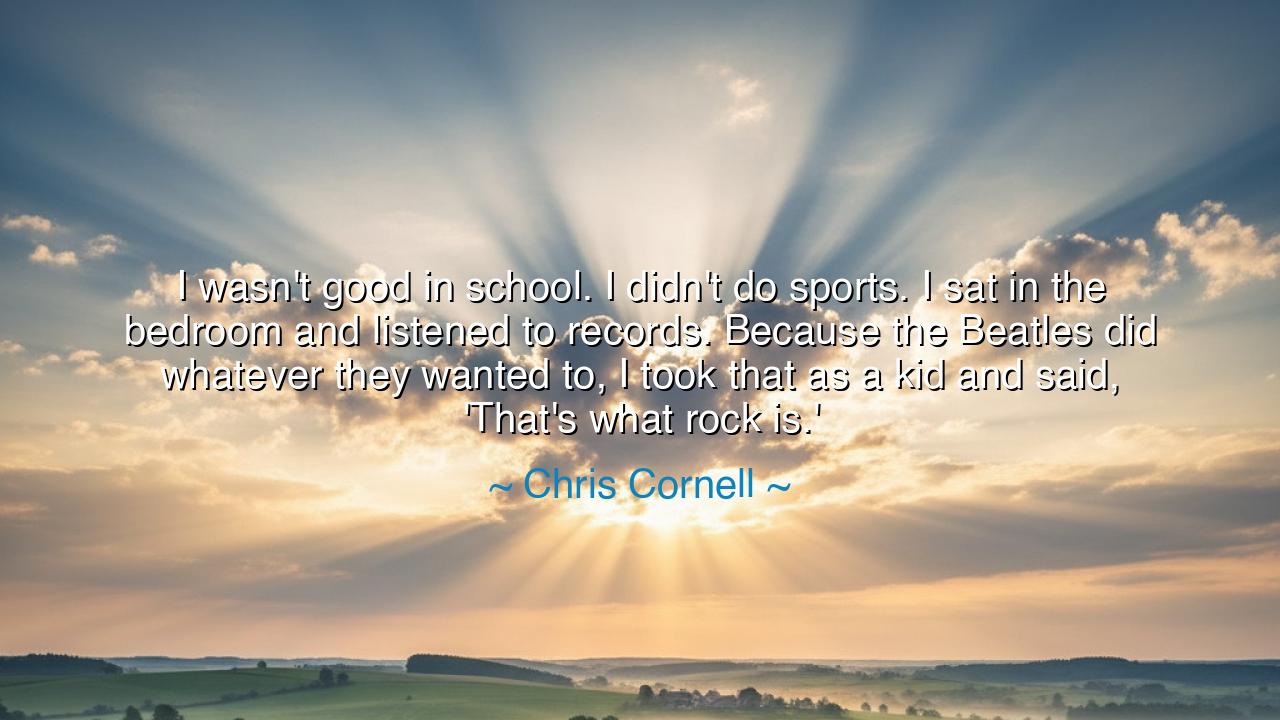
I wasn't good in school. I didn't do sports. I sat in the
I wasn't good in school. I didn't do sports. I sat in the bedroom and listened to records. Because the Beatles did whatever they wanted to, I took that as a kid and said, 'That's what rock is.'






Chris Cornell, the voice of fire and sorrow, once revealed of his youth: “I wasn’t good in school. I didn’t do sports. I sat in the bedroom and listened to records. Because the Beatles did whatever they wanted to, I took that as a kid and said, ‘That’s what rock is.’” These words are not merely the confession of a boy who struggled with the world’s expectations—they are the declaration of a soul who found refuge in music when all other paths seemed closed. They reveal the truth that destiny is not always found in classrooms or in fields of play, but sometimes in solitude, in the quiet hours when one listens and begins to dream.
The essence of his words lies in rebellion and discovery. Where school demanded conformity and sports required physical strength, Cornell instead turned to the sanctuary of sound. The records spinning in his bedroom were not distractions—they were teachers, guides, and companions. Through them, he discovered freedom, the possibility of living outside the strict patterns of society. The Beatles, who dared to break the rules of music and reinvent themselves at every turn, became his prophets, showing him that art was not about obedience but about daring to be true.
This story is echoed in history many times. The young Beethoven, unruly and misunderstood, found no solace in the rigid structures of school, but in the piano he discovered his kingdom. Likewise, the poet Walt Whitman, mocked for his lack of refinement, rejected society’s narrow measures of success and instead sang the vast song of himself, a hymn that reshaped literature. Cornell’s journey follows this same lineage: the misunderstood youth who finds power not in fitting in, but in embracing the path of passion.
Cornell also points us to the essence of rock music itself. It is not merely a genre, not merely sound—it is a philosophy of life. To him, and to many, rock is the courage to “do whatever you want,” to break chains, to invent new paths, to speak when others demand silence. In his own life, this philosophy birthed the thunder of Soundgarden, the melancholy of Audioslave, and the haunting beauty of his solo work. His art became the proof of his boyhood discovery: that rock is freedom, and freedom is truth.
But within his words lies something more tender: the acknowledgment of outsidership. He was not the star athlete, nor the brilliant scholar, but the boy in the room, headphones on, learning the language of another world. Many who hear his story will see themselves in it—for how many have felt the sting of not belonging, the sense of being out of step with what the world rewards? Cornell shows that such alienation is not the end, but the beginning, if one dares to turn inward and discover what truly ignites the soul.
The lesson is clear: when the world tells you that you do not fit, do not despair. Instead, seek where your passion lies, even if it is in hidden corners, even if it is in the solitude of your room. For what matters is not excelling at what others demand, but finding the fire that makes your life your own. As Cornell followed the Beatles’ example to create his own path, so too must each of us listen deeply—not only to music, but to the voice within—that says, “This is what I was born to do.”
So I say to you: do not fear if you are not good at what the world calls important. Do not grieve if you are not crowned on the playing field or praised in the classroom. Instead, search for your records, your instruments, your words, your tools—the things that awaken your spirit. For in those, you will find your freedom. And if you follow them with courage, as Chris Cornell did, you may discover not only yourself, but a gift that will echo beyond your own life, inspiring generations yet unborn.






AAdministratorAdministrator
Welcome, honored guests. Please leave a comment, we will respond soon